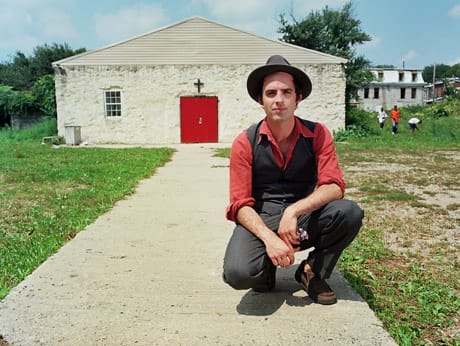Clap Your Hands Say Yeah front-man Alec Ounsworth will have released two albums by the end of this year. In August, he released the debut album from his Flashy Python project, a gritty, bass-heavy garage album characterized by his signature musical looseness and ramshackle production. When producer Steve Berlin invited him down to New Orleans, it hadn't crossed Ounsworth's mind to record a solo album but given his repertoire of unreleased songs and his interest in working with some of New Orleans' famous musical veterans (Stanton Moore, George Porter, Jr., and Robert Walter, to name a few), he couldn't say no. It's a good thing too; Mo Beauty is tighter, prettier and more sophisticated than anything Ounsworth has heretofore recorded. It's a swaggering, confident record marked by exquisite arrangements and intelligent, nuanced production that uses space to highlight the unique emotion of each song. It helps that Ounsworth is also at his best ― the songs here are melodic and powerful, with musical flourishes that can undoubtedly be at least partly attributed to his excellent backing band. Mo Beauty is an accomplished and satisfying record that demonstrates both Ounsworth's musical versatility and his commitment to the continual honing of his craft.
How did you decide which songs would end up on Mo Beauty?
Well, some of them are new songs that I wrote specifically for the New Orleans record. Some of the older songs were ones that didn't seem right for the Clap Your Hands treatment and didn't necessarily seem right for the Flashy Python treatment and it just so happened that I had a good group of musicians to bring it to.
What was different or new about working with the veterans you did on this record?
The New Orleans band were more experienced, so were able to put together something I was fond of in a short period of time. It might have been more difficult to do that here in Pennsylvania.
These songs definitely seem more restrained than your musical output to date, prettier, perhaps.
Yeah, I suppose. The image I had for Clap Your Hands was this swirling, synth-driven sound through which my voice would have to cut to be audible, whereas here we scaled it back to the more naked elements, despite there being so much arrangement involved. It's less dark and jarring than my other material; I tried to point the songs in that [prettier] direction on this record.
(ANTI- Records)How did you decide which songs would end up on Mo Beauty?
Well, some of them are new songs that I wrote specifically for the New Orleans record. Some of the older songs were ones that didn't seem right for the Clap Your Hands treatment and didn't necessarily seem right for the Flashy Python treatment and it just so happened that I had a good group of musicians to bring it to.
What was different or new about working with the veterans you did on this record?
The New Orleans band were more experienced, so were able to put together something I was fond of in a short period of time. It might have been more difficult to do that here in Pennsylvania.
These songs definitely seem more restrained than your musical output to date, prettier, perhaps.
Yeah, I suppose. The image I had for Clap Your Hands was this swirling, synth-driven sound through which my voice would have to cut to be audible, whereas here we scaled it back to the more naked elements, despite there being so much arrangement involved. It's less dark and jarring than my other material; I tried to point the songs in that [prettier] direction on this record.
